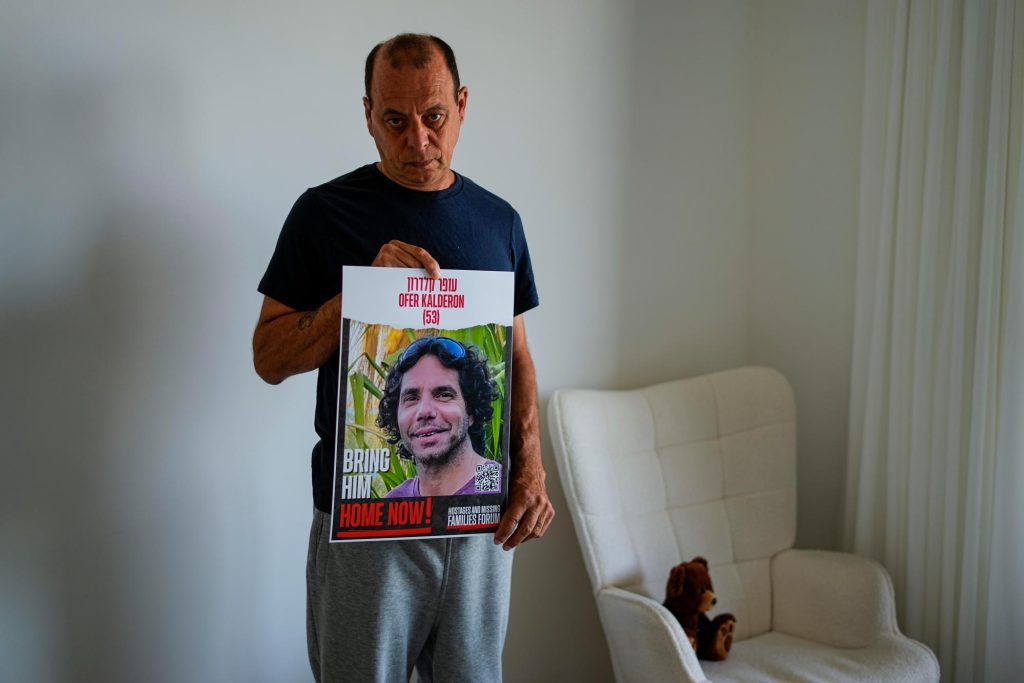By Julia Frankel, Associated Press
JERUSALEM (AP) — The families of hostages held in Gaza since Oct. 7 are struggling with despair, with one brother considering suicide, a sister no longer attending school, and a father hardly speaking.
They believed a cease-fire was imminent, which would have meant some of their loved ones coming home, but that didn't happen. The informal deadline of the start of Ramadan, the Muslim holy month that began Monday, came and went without any agreement. Israeli Prime Minister Benjamin Netanyahu’s ”total victory” promise in the war against Hamas now seems empty to many families after five emotionally taxing months.
“We keep reading the news constantly. Egypt, Qatar, and the U.S. all have varying information, and Israel has conflicting reports, ” said Sharon Kalderon, whose brother-in-law, Ofer, is still captive. “We try to read between the lines, but we haven’t heard anything about Ofer for months. Nothing that can ease our minds.”
A protester wrapped in the Israeli flag holds a sign during a demonstration demanding the release of hostages held by Hamas in the Gaza Strip, in Tel Aviv, Israel, Saturday, March 9, 2024. (AP Photo/Ariel Schalit)
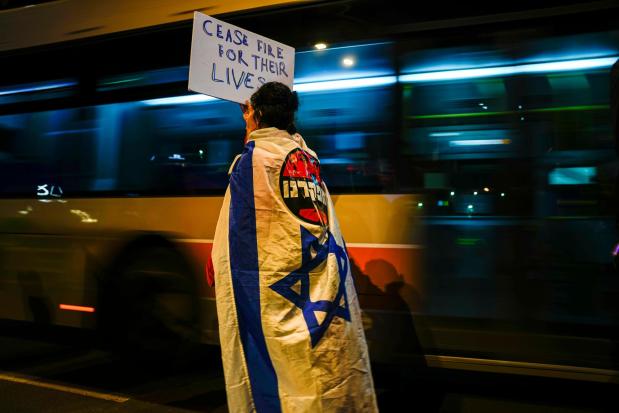
Hamas has been labeled as a terrorist group by the United States, Canada, and the European Union. Around 120 hostages were released during a November cease-fire, which also led to the liberation of hundreds of Palestinians from Israeli jails, but three hostages were mistakenly killed
by Israeli forces during a rescue operation. The families are now determined to bring home the remaining hostages, of which at least 34 have died, according to the Israeli government.
Some families are doing everything they can to advocate for the return of their loved ones, whether it's traveling to the U.N. in New York, marching to Jerusalem from southern Israel, or wearing red shirts with the words “Bring them Home” during the Jerusalem marathon. Friends and family members of the Israeli hostages held by Hamas in the Gaza Strip attend a rally demanding their release, in Tel Aviv, Israel, Saturday, March 9, 2024. (AP Photo/Ariel Schalit) However, for other families, a quieter suffering has taken hold.
”You see some of the families running around, going on the TV, making noise. These are the ones that are holding on,” said Ricardo Grichener, the uncle of Omer Wenkert, a 22-year-old captive. “The ones that are not leaving the houses, they are in a really bad situation.” After their home in Kibbutz Nir Oz was destroyed on Oct. 7, Sharon Kalderon and her husband, Nissan, have been staying on the 12th floor of an apartment building in the Israeli city of Ramat Gan. Ofer, Nissan’s only brother, remains captive. Nissan has recently considered ending his own life. Nissan said, “This situation is tough. I have trouble sleeping and eating. I'm not working. I feel like I'm losing my mind. It's too much.” Sharon said she gets scared whenever he goes out to the balcony.
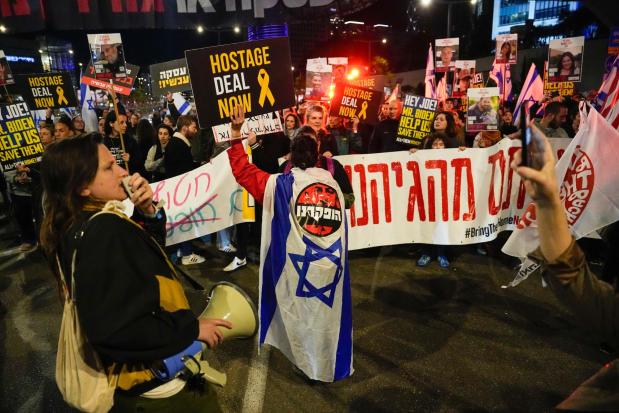
Grichener said, “We don’t see a chance for a deal unless (U.S. President Joe) Biden performs a miracle. We don’t see a way out or any reason why Hamas would be flexible. They don't gain anything. We are urging the (Israeli) government, but I think they have already made mistakes.”
Friends and family of the Israeli hostages held by Hamas in the Gaza Strip gathered for a rally in Tel Aviv, Israel, on Saturday, March 9, 2024. (AP Photo/Ariel Schalit)
His nephew Omer, who is being held captive, requires medication for his digestive illness. His family is unsure if the medical aid that entered Gaza in January reached him. medical aid for hostages that entered Gaza in January ever made it to him.
Meetings between the families and war cabinet officials are ongoing, but families feel powerless to change the course of negotiations. Many have not received official updates on the status of their loved ones and are holding onto
snippets conveyed by hostages released in November.
Shlomi Berger, the father of 19-year-old Agam Berger, said he last heard that she was alive in November. A hostage released during the cease-fire, Agam Goldstein-Almog, told him that his daughter — one of 19 women hostages, according to Israel — was alive and had wished him a happy birthday.
“It was an incredible relief to finally hear from my daughter,” Berger expressed.
Police used a water cannon to disperse demonstrators protesting against Israeli Prime Minister Benjamin Netanyahu’s government and calling for the release of hostages held by Hamas in the Gaza Strip, in Tel Aviv, Israel, on Saturday, March 9, 2024. (AP Photo/Ariel Schalit)
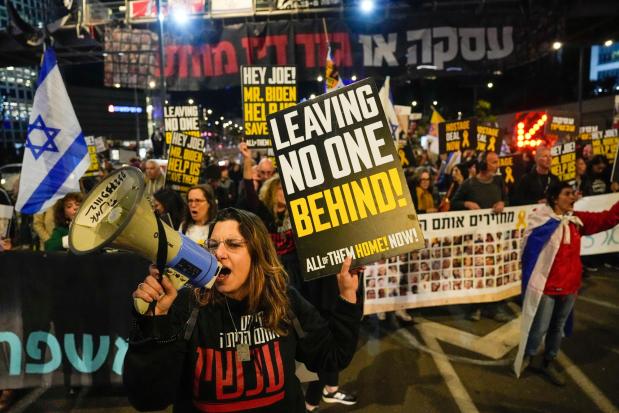
Berger mentioned, “No one knows her situation. It's concerning whether she has air, water, or period supplies. It's distressing. We don't even know if she has been sexually abused. We are left in the dark about whether she's alive or dead.” Israel’s National Insurance provides mental health counseling for parents, spouses, and children of hostages. Despite this, Berger's family feels unable to act due to the circumstances. One of his three daughters, a high school senior, has not attended school since October 7. Another daughter has stopped eating. His wife, who is an industrial engineer, has stopped working. He tries to avoid the news to spare himself from the daily emotional ride.
“One moment you read the news and feel hopeful, and the next moment you lose hope. No one really knows what's going on,” he stated. During the night, 33-year-old Or Levy's parents started taking care of Levy's 2-year-old son, Almog. Almog's mother, Eynav, was killed by Hamas fighters, and Levy was taken hostage on Oct. 7. The family had to tell young Almog that his mother is dead and his father is missing.
Michael Levy, Or's brother, said, “Most days I don’t even recognize my parents. My dad barely talks. Before Oct. 7, the last thing you could say about him was that he was a fragile man and now everybody who sees him is afraid to hug him.” Levy also mentioned that he has lost 9 kilos (20 pounds) and struggles to sleep.
In the future, relatives said they will continue to meet with the war cabinet and keep hoping for an eventual release.
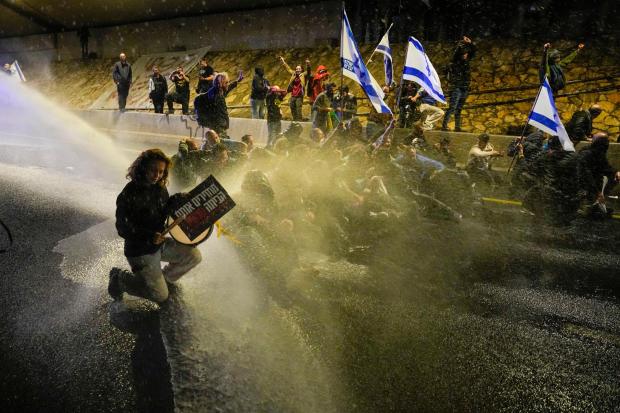
Sharon expressed their disappointment, saying, “We really thought, today is the day. But unfortunately, this is just another day.”
Many hostages’ relatives now feel that Israeli Prime Minister Benjamin Netanyahu’s promise to achieve ‘total victory’ has lost its credibility.
Israel’s National Insurance pays for mental health counseling for parents, spouses, and children of hostages. Still, the situation has paralyzed Berger’s family.
One of his three daughters, a senior in high school, has not gone to school since Oct. 7. One of his young daughters has stopped eating. His wife, an industrial engineer, does not go to work. He tries to avoid the news, to save himself the daily roller coaster.
“One minute you read the news and say, okay, it’s close, and another minute it’s not. Nobody really knows what’s happening,” he said.
Overnight, the parents of 33-year-old Or Levy became caretakers to Levy’s 2-year-old son, Almog. Hamas fighters killed Almog’s mother, Eynav, and took Levy hostage on Oct. 7. The family had to explain to young Almog that his mother is dead and his father missing.
“Most days I don’t even recognize my parents. My dad barely talks. Before Oct. 7, the last thing you could say about him was that he was a fragile man and now everybody who sees him is afraid to hug him,” said Michael Levy, Or’s brother. Levy said he’s lost 9 kilos (20 pounds) and barely sleeps.
Going forward, relatives said their strategies won’t change. They will continue to meet with the war cabinet, continue hoping for an eventual release.
On Monday, Sharon and Nissan Kalderon watched the sun set on the first full day of Ramadan.
“We really thought, today is the day,” Sharon said. “But unfortunately, this is just another day.”





